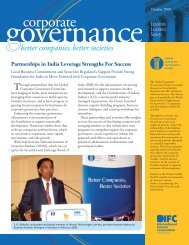Corporate Governance for Banks in Southeast Europe: Policy - IFC
Corporate Governance for Banks in Southeast Europe: Policy - IFC
Corporate Governance for Banks in Southeast Europe: Policy - IFC
Create successful ePaper yourself
Turn your PDF publications into a flip-book with our unique Google optimized e-Paper software.
Table 2: Number of <strong>Banks</strong> and Percent of Registered Capital Foreign-ownedJurisdiction/CountryNumber of banks% of registered capital<strong>for</strong>eign-owned2007 2008 2009 2010 2007 2008 2009 2010Albania 16 16 16 16 93.9 93.9 93.3 92.1Bosnia and Herzegov<strong>in</strong>a(Federation)22 20 20 19 92.4 94.3 93.9 91.9Bosnia and Herzegov<strong>in</strong>a(Republika Srpska)10 10 10 10 na 91.9* 91.1* 91.3*Bulgaria 29 30 30 30 82.1* 83.9* 84.1* 80.7*Croatia 33 39 39 38 90.6 90.8 91.0 90.4FYR Macedonia 18 18 18 18 85.9 92.7 93.3 92.9Montenegro 11 11 11 11 79.0 85.0 87.0 88.0Romania 31 32 31 32 87.7 88.2 85.3 85.1Serbia 35 34 34 33 75.6 75.5 74.3 73.5Source: Data from BSCEE Review 2009 and BSCEE Review 2010. http://www.bscee.org.*Percentage on the basis of total assets.Foreign banks typically entered the SEE region as strategic <strong>in</strong>vestors. They brought stability to the bank<strong>in</strong>gsector and a significant knowledge transfer from more developed markets. They also served to <strong>in</strong>troducegood corporate governance practices, which they did by revamp<strong>in</strong>g the banks they acquired. Foreign banksalso brought with them experience with home-country bank regulations. They typically complied with BaselII, International F<strong>in</strong>ancial Report<strong>in</strong>g Standards (IFRS), and, when listed, the stock exchange rules <strong>in</strong> their homemarkets. Because of account<strong>in</strong>g rules and prudential regulation, <strong>for</strong>eign bank subsidiaries were required tomeet both their home requirements and those of local regulators. These home regulations were typicallymore str<strong>in</strong>gent than local regulation, but, equally important, the banks had long experience <strong>in</strong> compliance.The <strong>for</strong>eign <strong>in</strong>flux has not come without challenges. Foreign banks created considerable competition <strong>for</strong>domestic banks. They had easier access to fund<strong>in</strong>g, could f<strong>in</strong>ance larger companies, and had establishedproducts and services, procedures and systems, and economies of scale. For supervisors, hav<strong>in</strong>g a greatnumber of banks that followed a sophisticated external regulatory regime seemed to provide significantbenefits <strong>in</strong> efficiency, security, and application of best practice. However, dur<strong>in</strong>g the crisis, news from abroadworried some regulators, who saw that local bank strategy was controlled from abroad, and that they hadlimited control over <strong>for</strong>eign group entities.The crisisThe 2007 crisis came as an exogenous shock to SEE. At the time, one of the fears was that <strong>in</strong>ternationalbank<strong>in</strong>g groups would withdraw from the region. Given their overwhelm<strong>in</strong>g importance to the local bank<strong>in</strong>gsector, their departure would have triggered a systemic bank<strong>in</strong>g crisis with ensu<strong>in</strong>g damage to the realeconomy. Fortunately, these fears were met by a strong national and regional response.A key factor <strong>in</strong> stabiliz<strong>in</strong>g the bank<strong>in</strong>g sector on the regional level was the <strong>Europe</strong>an Bank Coord<strong>in</strong>ationInitiative (EBCI), the so-called “Vienna Initiative” that was launched at the height of the f<strong>in</strong>ancial crisis whenbanks were try<strong>in</strong>g to take as much liquidity out of the region as possible. EBCI was designed to provide a8<strong>Policy</strong> Brief<strong>Corporate</strong> <strong>Governance</strong> <strong>for</strong> <strong>Banks</strong> <strong>in</strong> <strong>Southeast</strong> <strong>Europe</strong>



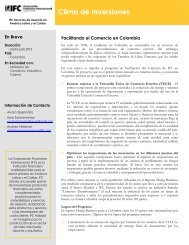
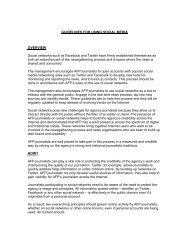
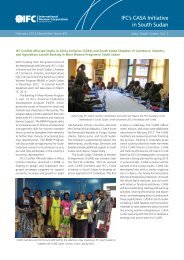
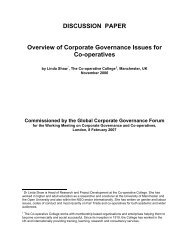
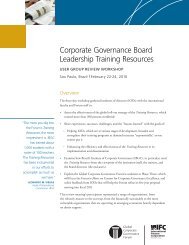

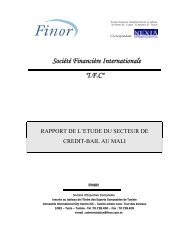


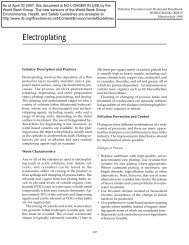
![Print a two-page fact sheet on this project [PDF] - IFC](https://img.yumpu.com/43449799/1/190x245/print-a-two-page-fact-sheet-on-this-project-pdf-ifc.jpg?quality=85)

